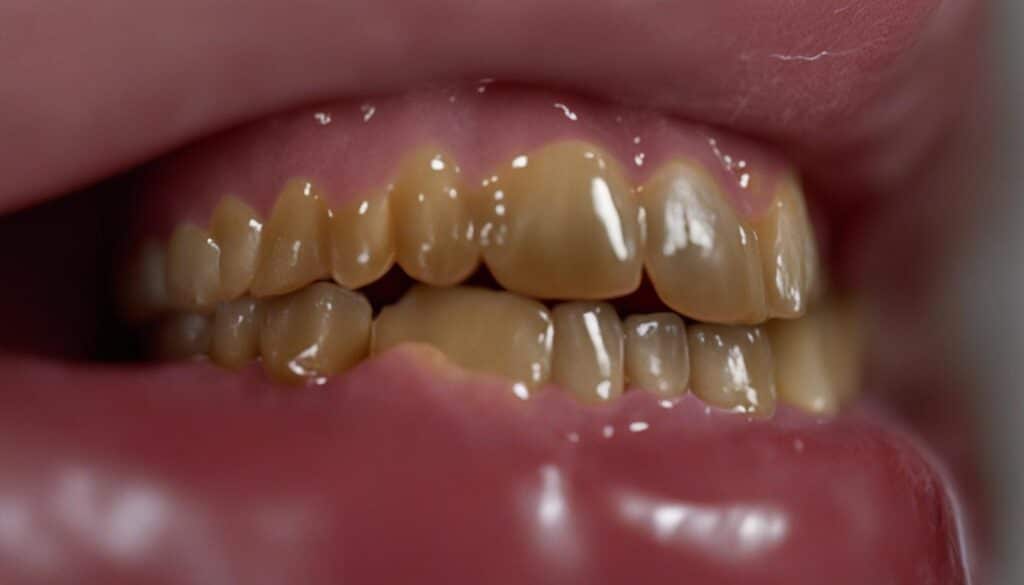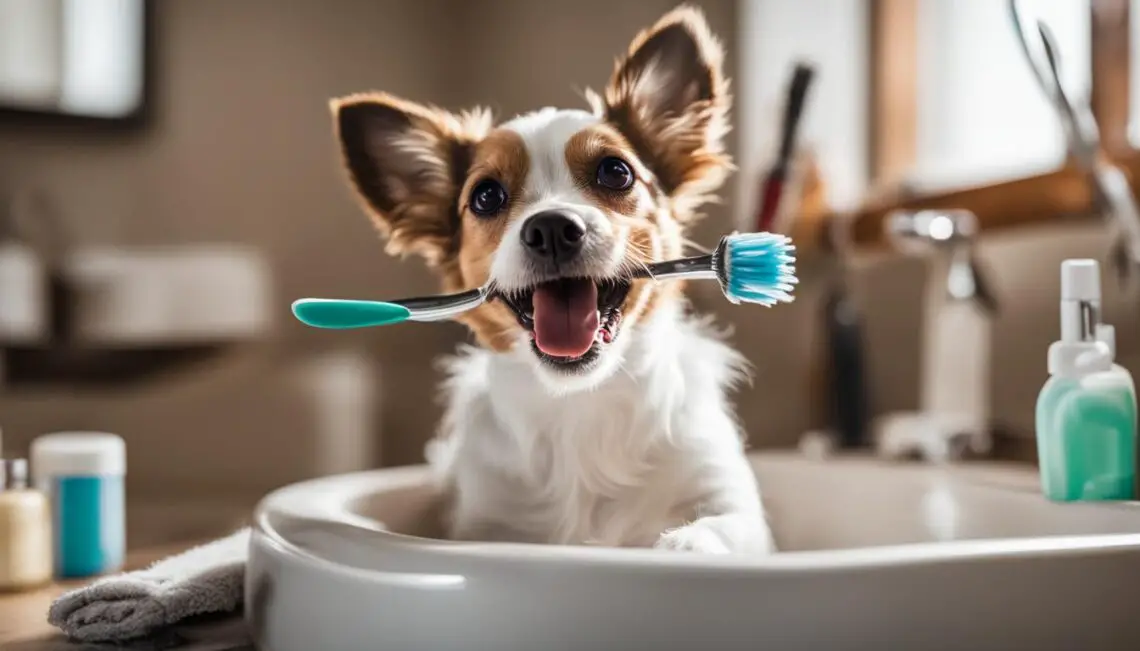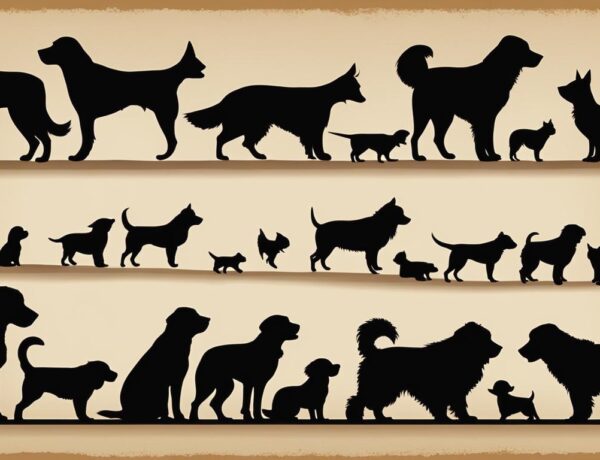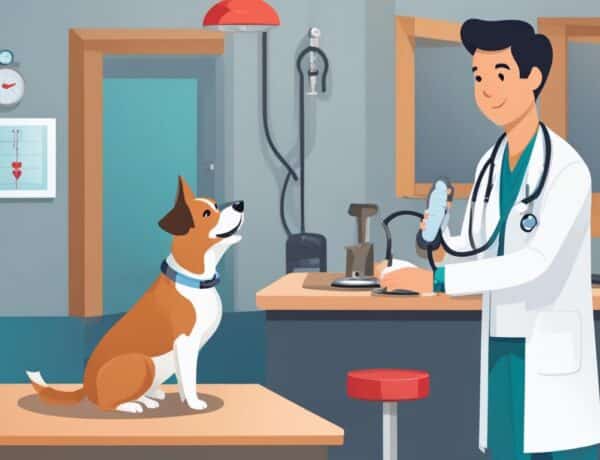Maintaining proper dental care for small dogs is crucial to their overall health. Small breeds, like Greyhounds and other small-breed dogs, are especially prone to dental disease. In addition to regular dental cleanings at the vet’s office, there are several at-home dental care tips that can help keep your small dog’s teeth and mouth clean.
Brushing your dog’s teeth with canine toothpaste is one of the best ways to eliminate bad breath and prevent plaque buildup. It is recommended to brush their teeth 2-3 days a week, or even daily if possible. If your dog is not comfortable with tooth brushing, other options include adding dental powder to their meals, using a dental water additive, giving them dental treats, or feeding them prescription dental food. Regular dental cleanings by a veterinarian may also be necessary, depending on your dog’s breed and dental care routine.
Key Takeaways:
- Regular dental care is important for small dogs’ overall health.
- Brushing your dog’s teeth with canine toothpaste helps prevent plaque buildup and bad breath.
- Alternative options for dental care include dental powder, water additives, dental treats, and prescription dental food.
- Regular dental cleanings by a veterinarian may be necessary for some breeds.
Common Dental Problems in Small Breed Dogs
Small breed dogs are more susceptible to certain dental problems. One common issue is retained deciduous (baby) teeth, where the adult tooth fails to push out the baby tooth. This can lead to additional dental complications and should be evaluated by a veterinarian. Another problem is tooth abscesses, which are advanced forms of infection that occur when bacteria invade the inside of a tooth. Pathologic jaw fractures are also more common in small breed dogs due to their early loss of jaw bone density and increased risk of dental infections. Regular dental exams by a veterinarian are important to catch and treat these issues early on.
Retained Deciduous Teeth
Retained deciduous teeth, also known as retained baby teeth, can be a dental problem in small breed dogs. This occurs when the adult tooth does not push out the baby tooth, causing both teeth to be present in the mouth simultaneously. It is important to address this issue because retained deciduous teeth can cause overcrowding and misalignment of the adult teeth. This can lead to further dental complications such as plaque buildup, tooth decay, and gum disease. A veterinarian should evaluate and, if necessary, extract the retained deciduous teeth to prevent oral health issues in small breed dogs.
Tooth Abscesses
Tooth abscesses are another common dental problem in small breed dogs. They occur when bacteria invade the inside of a tooth, leading to infection and pus formation. Tooth abscesses are often caused by advanced dental disease, such as untreated tooth decay or gum disease. Small breed dogs may be more prone to tooth abscesses due to their smaller teeth and jaws, which can make it easier for bacteria to penetrate the tooth. Signs of a tooth abscess in small breed dogs may include swelling around the affected tooth, pain or discomfort, bad breath, and difficulty eating. It is essential to seek veterinary care to treat tooth abscesses, as they can be painful and potentially lead to more serious complications if left untreated.
Pathologic Jaw Fractures
Pathologic jaw fractures are fractures that occur in the jawbone of small breed dogs. These fractures are often associated with advanced dental disease, such as severe tooth decay or periodontal disease. Small breed dogs may be more susceptible to pathologic jaw fractures due to their early loss of jaw bone density and increased risk of dental infections. Pathologic jaw fractures can cause significant pain and difficulty in eating, which can negatively impact a dog’s overall quality of life. Treatment for pathologic jaw fractures typically involves dental extractions and stabilization of the jawbone. Regular dental exams and prompt treatment of dental issues can help prevent pathologic jaw fractures in small breed dogs.

By being aware of these common dental problems in small breed dogs, pet owners can take proactive steps to maintain their dog’s oral health. Regular dental check-ups with a veterinarian, along with a consistent dental hygiene routine at home, can help prevent and address these issues before they become more severe. It is important to prioritize dental care for small breed dogs to ensure their overall well-being and longevity. Remember, a healthy mouth contributes to a happy and thriving small dog!
Tips for Maintaining Good Dental Hygiene in Small Dogs
When it comes to maintaining good dental hygiene in small dogs, there are several important steps to follow. One of the most effective methods is brushing your dog’s teeth regularly. Using a dog-specific toothpaste and toothbrush or finger brush, gently clean their teeth 2-3 days a week, or even daily if possible. This helps prevent plaque buildup and eliminates bad breath.
If your dog is not comfortable with tooth brushing, there are alternative options available. Dog tooth wipes can be used to wipe away plaque and keep their teeth clean. Additionally, dental treats for dogs and dog chews designed for dental health are beneficial. These treats and chews help remove plaque and freshen your dog’s breath while providing them with a tasty reward.
In addition to at-home care, it is crucial to schedule regular professional dental cleanings for your small dog. These cleanings, performed by a veterinarian, allow for a thorough examination of your dog’s oral health and the treatment of any dental issues that may have gone unnoticed. Professional cleanings are essential in maintaining your small dog’s overall dental hygiene.
By following these tips, you can ensure that your small dog has healthy teeth and a happy mouth. Whether you choose to brush their teeth, use tooth wipes, provide dental treats, or schedule professional cleanings, taking proactive steps to maintain your small dog’s dental health is key to their overall well-being.
FAQ
How often should I brush my small dog’s teeth?
It is recommended to brush your small dog’s teeth 2-3 days a week, or even daily if possible.
What if my dog is not comfortable with tooth brushing?
If tooth brushing is not feasible, you can try adding dental powder to their meals, using a dental water additive, giving them dental treats, or feeding them prescription dental food.
Are there any alternatives to brushing for maintaining my small dog’s dental health?
Yes, you can use dog tooth wipes to remove plaque. Dental treats for dogs and dog chews specifically designed for dental health are also effective in keeping their teeth clean.
How often should I have my small dog’s teeth professionally cleaned by a veterinarian?
Regular professional dental cleanings by a veterinarian are essential for maintaining your small dog’s oral health. The frequency of these cleanings will depend on your dog’s breed and dental care routine.
What dental problems are common in small breed dogs?
Small breed dogs are more susceptible to dental problems such as retained deciduous teeth, tooth abscesses, and pathologic jaw fractures.





2 Comments
Utwórz konto na Binance
July 9, 2024 at 11:24 amYour point of view caught my eye and was very interesting. Thanks. I have a question for you.
Реферальный бонус на binance
July 23, 2024 at 12:56 amCan you be more specific about the content of your article? After reading it, I still have some doubts. Hope you can help me.